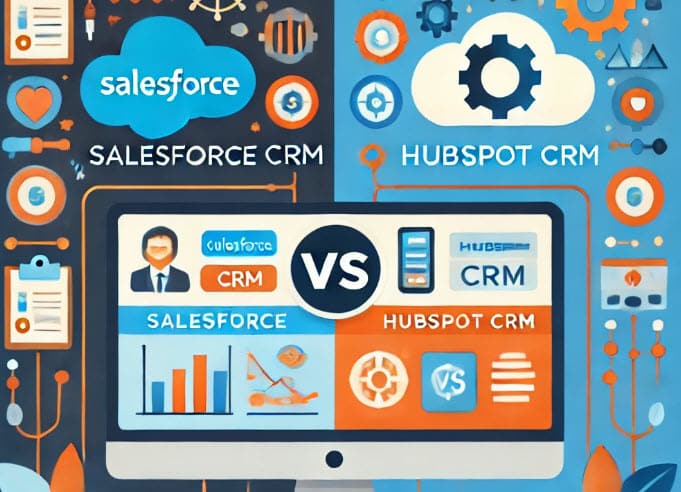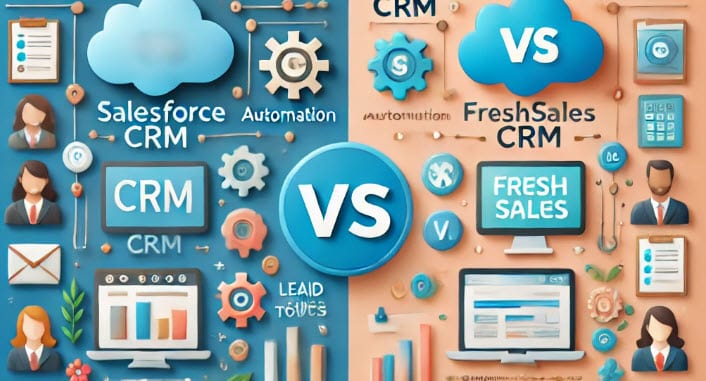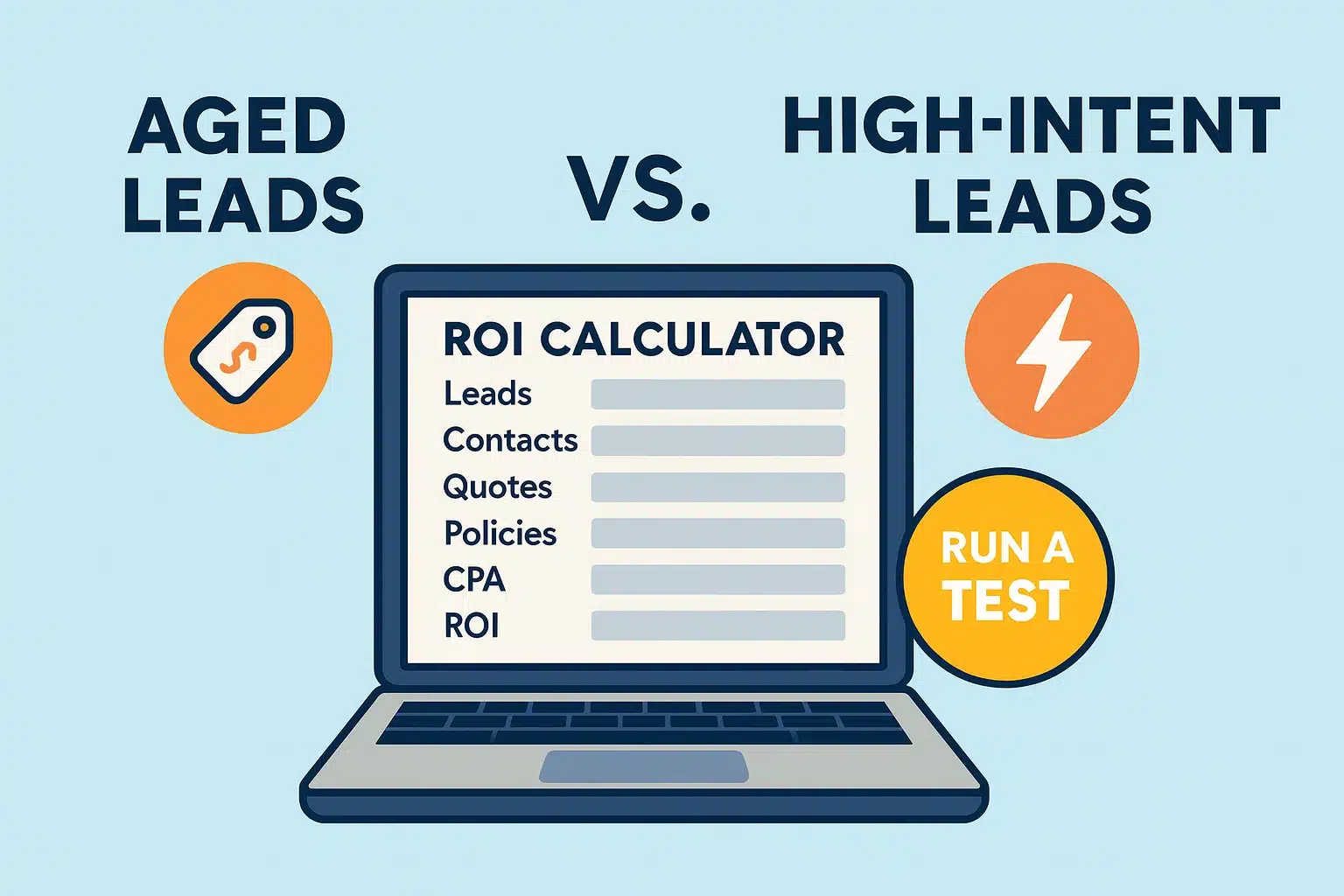
Salesforce CRM vs HubSpot CRM: In-Depth Comparison for Insurance Agents
TL:DR; Salesforce is best for large insurance agencies needing customization and automation, while HubSpot suits smaller agencies with its free plan and user-friendly interface. Salesforce offers more advanced features, but HubSpot is easier to use and more affordable for agents or brokers.
When it comes to choosing a CRM for your insurance agency to manage life insurance leads, two of the biggest contenders are Salesforce CRM and HubSpot CRM. Both platforms are powerful tools with distinct features, but they cater to different needs depending on your agency’s size, goals, and budget. Let’s dive deep into this comparison to help you decide which is the best fit for your business.
Overview: Salesforce CRM
Salesforce is an industry-leading CRM platform known for its scalability, advanced customization, and wide array of features. While it caters to companies of all sizes, its robust set of tools is best suited for larger insurance agencies with complex sales pipelines and the need for deep customization.
Key Features of Salesforce CRM:
- Highly Customizable: You can build custom workflows, reports, and dashboards tailored to your specific insurance business processes.
- AI-Powered Insights: Salesforce’s Einstein AI helps predict client needs and optimize sales strategies.
- Third-Party Integrations: Salesforce has an extensive app marketplace with thousands of integrations.
- Automation: It allows you to automate routine tasks like follow-ups, reminders, and policy renewals.
- Scalability: Ideal for larger insurance agencies or those looking to scale quickly.
Pricing: Salesforce pricing starts at $25/user/month but can easily rise to $300/user/month or more for advanced features.
Overview: HubSpot CRM
HubSpot is known for its user-friendly interface and being highly accessible for small to medium-sized businesses. It offers many of its CRM tools for free, making it a great starting point for smaller insurance agencies or those new to CRM software.
Key Features of HubSpot CRM:
- Free Plan: The free version offers powerful tools like lead management, task tracking, and email tracking.
- Ease of Use: It has a simple, intuitive interface that requires little to no setup time.
- Marketing Tools: HubSpot is a leader in marketing automation, providing email marketing, SEO, and social media tools.
- All-in-One Platform: Offers seamless integration of sales, marketing, and customer service tools.
- Custom Reports and Dashboards: You can track pipeline progress and client data easily with pre-built templates.
Pricing: HubSpot CRM has a free version, with paid plans starting at $45/month. However, for more advanced features like marketing automation, pricing can escalate to $800/month or more.
In-Depth Comparison for Insurance Agents
- Lead Management and Nurturing
- Salesforce CRM: Offers advanced lead management tools, perfect for insurance agents managing a large pipeline. You can create custom workflows to automate follow-ups, lead assignments, and client nurturing. This is particularly useful when tracking long-term leads like potential life insurance or annuity clients.
- HubSpot CRM: Provides a streamlined lead management system, with the added advantage of built-in marketing tools for email campaigns and content offers. While not as customizable as Salesforce, it’s easy to use for agents focusing on customer engagement and lead nurturing without complex setups.
- Policy Tracking and Renewals
- Salesforce CRM: With its extensive customization options, Salesforce allows insurance agents to build workflows that automate policy tracking, renewal reminders, and even claims follow-ups. It’s ideal for agencies that deal with large volumes of policies or complex renewals.
- HubSpot CRM: HubSpot’s simpler system handles basic task automation, such as sending reminders for policy renewals. However, for detailed policy tracking, additional integrations may be required.
- Communication Tools
- Salesforce CRM: Salesforce integrates with various communication tools, including email and SMS platforms. It also has built-in features like chat and phone system integrations, perfect for staying connected with clients.
- HubSpot CRM: HubSpot excels in communication, particularly with its free built-in email tracking, live chat, and calling features. This makes it easy for insurance agents to track every client interaction in one place.
- Analytics and Reporting
- Salesforce CRM: Salesforce offers advanced reporting features, giving insurance agents the ability to create highly customized reports and dashboards. Whether you’re tracking sales conversions, policy renewals, or client satisfaction, Salesforce provides deep insights.
- HubSpot CRM: HubSpot’s reporting is more straightforward, with customizable dashboards that work well for smaller agencies. For more complex reporting, higher-tier plans unlock advanced analytics features.
- Ease of Use and Setup
- Salesforce CRM: While highly customizable, Salesforce can be complex to set up and requires significant training to use effectively. It’s better suited for agencies with a dedicated team or technical support for CRM implementation.
- HubSpot CRM: HubSpot’s greatest advantage is its ease of use. Insurance agents can quickly onboard and start using the platform without a steep learning curve. Its clean interface makes it ideal for agents looking to manage leads without technical complexity.
Side-by-Side Comparison: Salesforce CRM vs HubSpot CRM
| Features | Salesforce CRM | HubSpot CRM |
|---|---|---|
| Target Audience | Medium to large insurance agencies | Small to medium insurance agencies |
| Pricing | Starts at $25/user/month, scales to $300+ | Free plan, with paid tiers starting at $45/month |
| Customization | Extensive customization options for workflows and processes | Limited customization; ideal for out-of-the-box use |
| Ease of Use | Requires technical knowledge and training | Simple and easy-to-use interface |
| Automation | Robust automation for policy renewals, follow-ups, and more | Basic task automation (more with paid plans) |
| AI Features | AI-powered insights (Einstein AI) for predictive sales | No AI-based insights |
| Integration Options | 5,000+ integrations available in Salesforce AppExchange | 600+ integrations in HubSpot’s marketplace |
| Mobile App | Yes, fully-featured mobile app | Yes, easy-to-use mobile app |
| Reporting | Highly customizable reports with advanced analytics | Basic reporting with customizable dashboards |
| Customer Support | 24/7 support (with higher-tier plans) | Email, chat, and phone support (with paid plans) |
Which One is Better for Insurance Agents?
Salesforce CRM is a great choice for large, established insurance agencies that need full customization and the ability to scale. Its advanced features come at a higher price, but they allow you to automate complex workflows, predict sales trends, and gain in-depth insights.
On the other hand, HubSpot CRM is ideal for smaller insurance agencies or those new to using a CRM. With its free plan and easy-to-use interface, it allows you to quickly start managing leads and tracking interactions without the steep learning curve or costs associated with Salesforce.
Real-Life Story: Choosing the Right CRM for Growth
Take the case of Northside Insurance Agency, a growing firm that initially relied on manual lead tracking and spreadsheets. As their client base expanded, they needed a CRM that could handle complex workflows, improve customer service, and automate repetitive tasks.
After evaluating both HubSpot and Salesforce, they chose Salesforce because of its robust automation and customization options, which allowed them to create a seamless process for lead nurturing, policy renewals, and follow-ups. While the setup took time and required technical support, the agency’s productivity skyrocketed once they implemented Salesforce.
However, for smaller agencies like Main Street Insurance, HubSpot was the better choice. They were able to start with HubSpot’s free plan, quickly setting up email marketing campaigns and tracking their pipeline without needing technical expertise. As they grew, they scaled up to HubSpot’s paid plan to take advantage of its additional marketing automation tools.
Conclusion: Salesforce CRM vs HubSpot CRM
Ultimately, the decision between Salesforce CRM and HubSpot CRM comes down to the size and needs of your insurance agency. If you need extensive customization and are willing to invest in a powerful platform, Salesforce is the way to go. If you want a cost-effective, easy-to-use CRM with excellent marketing tools, HubSpot is the ideal choice.
FAQs
- Which CRM is better for small insurance agencies?
HubSpot CRM is better for small agencies due to its free plan and simple setup. - Can Salesforce CRM handle complex workflows?
Yes, Salesforce is built for handling highly customized workflows, making it ideal for larger agencies with specific needs. - Does HubSpot CRM offer automation?
Yes, HubSpot CRM offers basic automation features, and advanced automation is available in its paid plans.






